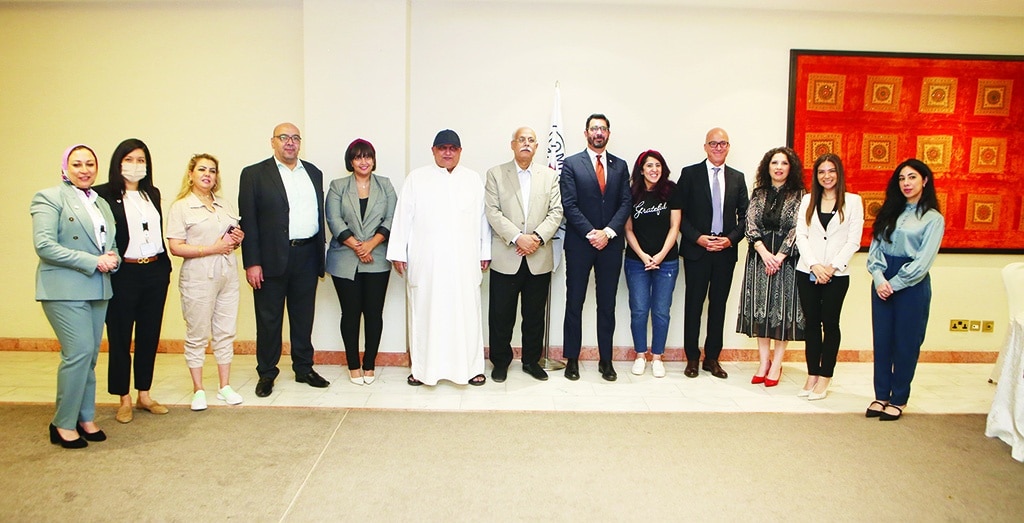By Faten Omar
KUWAIT: The International Committee of the Red Cross (ICRC) held a media roundtable on Thursday with Omar Odeh, Regional Head of Delegation for GCC Countries and Kuwait, to mark the end of his mission. Odeh discussed bilateral cooperation on various issues during his tenure with Kuwaiti authorities and partners, praising Kuwait for its keenness in humanitarian work, which is an effective and important role. "Kuwait was one of the countries that made efforts to resolve disputes in all countries. We thank the Amir of Kuwait Sheikh Nawaf Al-Ahmad Al-Jaber Al-Sabah for the neutral role of Kuwait," he said.
Odeh discussed the top achievements of ICRC during his mission in Kuwait. "For the first time in decades, we were finally able to bring answers to hundreds of missing persons' families from the 1990-1991 Gulf War. ICRC is very pleased about the continued positive outcomes, driven by cooperation between Kuwaiti and Iraqi authorities in the framework of the tripartite commission," Odeh said.
"The mission was not easy and resolving these cases takes time, patience and cooperation between governments and humanitarian organizations. It can take years of work to uncover answers. Despite the epidemic, cooperation between countries continued and we were fortunate to find the remains and even identify them after years of searching," he said.
 Omar Odeh speaks during the media roundtable.
Omar Odeh speaks during the media roundtable.New sites
Odeh revealed that two weeks ago, the tripartite commission met in Riyadh, hoping new sites of the remains will be found. After the end of the 1990-1991 Gulf War, ICRC, Iraq, Kuwait and members of the coalition (Saudi Arabia, France, United Kingdom and the United States) established a tripartite commission to search for missing persons. In 2021, the tripartite committee was able to officially close 60 files of missing persons and return the remains of two people from Kuwait to Iraq and Saudi Arabia.
During the 52nd meeting of the tripartite committee in December, it was announced that the cases of 30 missing persons and prisoners of war from the 1990-1991 Gulf War were formally closed, based on DNA analyses conducted at the Kuwaiti Department of Forensic Evidence. "For the first time, ICRC Regional Delegation in Kuwait signed a grant agreement with the Kuwait Red Crescent Society (KRCS) to support humanitarian assistance in Bangladesh, and this makes Kuwait a real model due to its importance local and international role. In addition, there was cooperation with the Kuwait Fund and policy discussions to enhance cooperation," Odeh said.
He noted that the joint venture with KRCS and Kuwait Fund for Arab Economic Development links to strategic discussions to address the evolving humanitarian needs of communities affected by the consequences of conflict. "Also, to spread awareness on international law, there is a plan to educate and train local cadres in international humanitarian law."
Humanitarian situation
Odeh highlighted the humanitarian situation and priorities of thousands of people facing conflict in the Middle East and beyond, pointing out that ICRC helps people affected by conflict and armed violence and promotes laws that protect victims of war. Regarding Yemen, he said: "The Yemen situation is different from other conflict areas, as one of our responsibilities is to engage in dialogue and discussion regarding the conflict itself, and not just distribute aid. ICRC engages in sustained dialogue with the parties to the conflict in Yemen on the conduct of their troops during armed hostilities and promotes respect for the rules enshrined in the international humanitarian law, which protects civilians and others. There is an ongoing secret talk with the coalition, along with regular coordination and aid."
Concerning the criticism of the amount of help victims of the Ukraine-Russia war received compared to victims of other countries, Odeh said that any armed conflict is a disaster. "We wish no harm to civilians, and this applies to all armed conflicts. It was important to try to host talks and discussions with Russia and to educate it about the international humanitarian law and find a way to evacuate affected civilians. This communication took another turn, and what was provided was criticized and compared with other aid," he said. Odeh affirmed ICRC always tries to find a balanced way to deliver help to all countries, but one of the most difficult things is that their needs are greater than any organization can handle.











